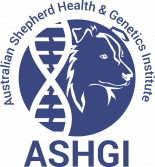What is renal dysplasia (RD)?
RD is a developmental defect of the kidneys; one or both fail to mature properly resulting in a loss of function.
How can I tell if my dog has RD?
Symptoms vary widely and can include excessive drinking or urination, lethargy, anorexia, vomiting, diarrhea, ulcers, pale gums, weakness, stunted growth, poor condition, dry coat, weight loss, or abnormal heat cycles in females. Blood and urine tests for kidney function can indicate whether RD is possible, but the only way to positively diagnose it is with a renal biopsy.
What does it mean for my dog if it has RD?
Depending on how bad the defect is some get sick and die young, those less affected may sicken and die in the prime of life, and some will live longer and die of something else, though RD may still shorten lifespan.
How common is RD in Aussies?
Uncertain, but probably rare. Only 1% of dogs in the ASHGI 2009-10 health survey were reported to have any kind of kidney disease. ASCA did a mini-survey on kidney disease and just under a third of those who had a dog with kidney disease said the dog had renal dysplasia.
Is RD inherited?
Yes, though mode of inheritance isn’t clear and possibly involves incomplete penetrance, meaning the gene(s) represent a risk factor for developing the disease.
Is there a DNA test?
A test was developed in the mid-2000s ago based on a research project published in the on-line research journal PLOS ONE. After publication concerns were presented to the journal sufficient for a review. PLOS ONE subsequently issues a Statement of Concern stating several serious deficiencies they found in the study. Apart from that, ASHGI was at about the same time involved in an effort to test Aussies related to one that had died of RD. Those results showed an extremely high incidence of dogs with two copies of the mutation but the almost all were and remained healthy.
What does RD mean for my breeding program?
Affected dogs should be withdrawn from breeding. Parents, offspring, and full and half siblings should be bred to mates that do not have any recent family history of RD or unspecified kidney disease.
